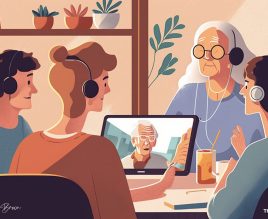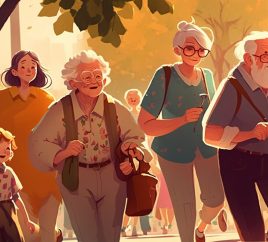Table of Contents
ToggleThe quest for eternal youth has persisted throughout human history, with myths and legends offering glimpses into a utopian world where time’s relentless march can be halted or reversed. As the 21st century unfolds, the confluence of groundbreaking scientific discoveries, technological advancements, and interdisciplinary research has brought us closer than ever before to unraveling the enigmatic nature of aging. This fascinating journey into the world of biogerontology seeks to explore the tantalizing possibility of reversing time and restoring our youthful vigor: can aging truly be reversed?
Aging is an inevitable, multifaceted process that involves the gradual deterioration of our biological and physiological functions. It is characterized by a complex interplay between genetic, epigenetic, and environmental factors, resulting in the progressive decline of cellular repair mechanisms, accumulation of molecular damage, and impaired tissue homeostasis. Consequently, the incidence of age-related diseases such as cancer, cardiovascular disorders, and neurodegenerative conditions increases exponentially as we grow older.
In recent years, researchers have made remarkable strides in understanding the fundamental mechanisms underlying aging. The discovery of specific genetic and epigenetic alterations, cellular senescence, and the role of telomeres have shed light on the intricacies of this complex process. Concurrently, advances in regenerative medicine, stem cell therapy, and gene editing technologies have opened up new avenues for potential interventions that could delay or even reverse the effects of aging.
As we delve deeper into the captivating world of reversing time, we will examine the groundbreaking discoveries that have brought us to the cusp of unlocking the secret to reversing aging. We will explore the biological, ethical, and social implications of this rapidly advancing field, and ponder the age-old question: can the elusive fountain of youth finally be within our grasp? Only time will tell, but our journey into the world of reversing aging promises to be a thrilling and enlightening one.
The Biology Of Aging: Why And How We Age?

The aging process is a fascinating, albeit complex, biological phenomenon. It involves numerous physiological changes, genetic factors, and environmental influences. The most basic explanation begins with cells. Over time, cells accumulate damage from internal and external factors, a process known as cellular senescence. This damage contributes to the aging process, leading to visible signs such as wrinkles and gray hair, and less visible but more significant changes, such as decreased organ function and immune system decline.
When we talk about aging, it’s crucial to differentiate between chronological and biological aging. Chronological aging refers to the number of years one has been alive, an inevitable aspect of life. On the other hand, biological aging refers to the changes that occur in the body over time, which can potentially be manipulated.
Aging is the gradual, progressive decline of bodily functions and structural integrity. It’s a natural process that kicks in as we get older. The biological cause of aging is driven by genetic, environmental and lifestyle factors. At the cellular level, aging is characterized by a decline in metabolic functions, such as mitochondrial activity and DNA replication. This age-related decline in cellular health increases our risk for various diseases. It also leads to decreased muscle mass, bone density and reduced immune function/
Can Aging Be Reversed: The Science Of Anti-Aging
You hear the old adage, “you can’t turn back the clock,” but what if you could? Scientists have been exploring the possibility of reversing aging for years. Recent studies have shown that it is possible to reverse the aging process in humans and animals. The concept might sound like it’s straight out of a sci-fi novel, but it’s a question that scientists are seriously asking. The answer, according to some, is a tentative yes.
Recent scientific breakthroughs have demonstrated the potential to reverse biological aging. The most significant breakthrough in anti-aging research came from a study conducted by Harvard Medical School, which showed that loss of epigenetic information could drive aging, and restoration can reverse it. This means that changes to how DNA is organized and regulated can cause cells to age, but these changes can also be reversed.
In another study at Cambridge’s Babraham Institute, scientists were able to reverse the aging process in human skin cells by 30 years. They developed a method to reset the epigenetic information of cells back to their youthful state. This method could potentially treat age-related diseases.
Another promising field is gene therapy. Research on animals, particularly on a tiny worm called C. elegans, has shown that manipulating certain genes can increase lifespan. Similarly, studies on telomerase, an enzyme that can extend telomeres, suggest that we might be able to manipulate telomere length to slow down or even reverse aging.
the concept of reversing aging is no longer confined to the realm of science fiction. It’s a burgeoning field with a plethora of research indicating that we may, one day, be able to turn back our biological clocks. However, until that day comes, the best anti-aging advice remains the same: maintain a healthy lifestyle, exercise regularly, eat a balanced diet, and stay mentally active. But who knows? Perhaps in the not-so-distant future, we’ll be able to add “take your anti-aging pill” to that list.
The Technology Of Anti-Aging: How We Can Rejuvenate Ourselves?

In the pursuit of youthfulness, technology plays a pivotal role. The latest technology of anti-aging has made it possible to reduce the process of aging. These technologies are based on genetic engineering, regenerative medicine, wearables and artificial intelligence (AI). From the microscopic level of our genes to the visible outcomes on our skin, a myriad of anti-aging technologies are emerging. Let’s explore how these innovations are reshaping our understanding of aging and its reversal.
Genetic Engineering
Genetic engineering, a revolutionary technology, holds immense potential in the realm of anti-aging. By manipulating our genetic material, it allows us to alter the genes associated with aging. This transformative technology can slow down, and potentially even reverse, the aging process. Further, genetic engineering could offer new treatments for age-related diseases, like Alzheimer’s and Parkinson’s, offering hope for a future where aging and disease are not inexorably linked.
Regenerative Medicine
The field of regenerative medicine focuses on healing damaged cells, tissues, and organs, essentially renewing them. Through techniques like tissue engineering and therapeutic stem cells, regenerative medicine can replace cells damaged by age or disease. This restoration of cellular function can slow down the aging process, leading to enhanced health and longevity.
Wearables & AI
The wearable technology, such as fitness trackers and smartwatches, is another frontier in the fight against aging. These devices can measure vital signs, track physical activity, and even detect diseases early. The data collected can inform personalized anti-aging plans that promote healthier lifestyle choices. Coupled with AI, which can analyze this data to detect early signs of aging, we’re looking at a powerful tool for proactive health management.
Stem Cell Technology
Stem cell technology takes a central position in anti-aging research. It works by reprogramming aged cells, restoring them to a youthful state. By replacing lost cells and tissues, stem cell technology could potentially slow down, or even reverse, the aging process, promising a future where ‘growing old’ takes on a whole new meaning.
Skin Surgery Technology
Skin surgery technology is a more direct approach to reversing signs of aging. Through techniques like laser resurfacing and fat grafting, surgeons can reduce wrinkles, minimize the appearance of scars, and even replace lost skin cells. This technology enables facial rejuvenation by removing the outermost layer of skin and replacing it with a younger, smoother layer.
While these technologies offer exciting prospects, it’s important to remember that they are still being researched and fine-tuned. Each person’s body will respond differently to these treatments, and consultation with a medical professional is essential before beginning any anti-aging regimen. As we continue to explore these technologies, one thing is certain – the future of anti-aging looks promising. Now, let’s turn our attention to lifestyle changes that can complement these technologies in slowing down the aging process.
Also read: Baby Boomers in the Digital Age: An In-depth Analysis
9 Tips For Lifestyle Changes That Slow Down The Aging Process
Regarding slowing down the aging process, lifestyle changes can be just as effective as any medical treatment. Here are some tips for living a healthier and longer life:
1. Exercise Regularly
Making a habit of physical activity keeps you fit and is also one of the most powerful tools to stave off the effects of aging. It helps keep your body and mind healthy, increases energy levels, and reduces stress. Studies have shown that regular physical activity can help prevent age-related diseases.
A good anti-aging exercise routine should involve aerobic activities such as walking, jogging, cycling, swimming and dancing. Strength training with weights and resistance bands is also beneficial for maintaining healthy muscle mass.
2. Eat a Balanced Diet
Eating a balanced diet is a key component of anti-aging. Add healthy foods and avoiding processed and junk food can help support your body’s natural defense against signs of aging. A variety of fruits, vegetables, and whole grains helps provide your body with essential vitamins and minerals.
Don’t forget to include anti-aging superfoods that can help you look and feel younger. Foods like blueberries, carrots, walnuts, and avocados contain antioxidants that fight free radicals. So, including these foods in your diet can help slow aging.
3. Get Adequate Sleep
Getting enough sleep is important for maintaining good health as we age. Not getting enough sleep can cause several health issues, including fatigue, poor concentration, weakened immunity, and an increased risk of developing chronic diseases. Aim for 7-9 hours of quality sleep each night to ensure your body has time to rest and repair itself.
4. Reduce Stress
Stress can seriously affect your physical, mental, and emotional health. High levels of stress hormones can lead to accelerated aging, elevated blood pressure, and a weakened immune system. Chronic stress can manifest in physical conditions such as wrinkles, hair loss and skin disorders.

Incorporating stress relief techniques into your daily routine is important to keep stress levels low. Practicing relaxation techniques such as yoga, meditation, and deep breathing can help to reduce stress levels. Taking time off from work to spend with family and friends or pursuing hobbies can also help to reduce stress.
5. Avoid Smoking & Excessive Alcohol Consumption
Smoking cigarettes can damage skin cells, leading to wrinkles and other signs of premature aging. Excessive alcohol consumption has also been linked to accelerated aging due to its dehydrating effects on the skin and its ability to damage DNA over time.
Limiting your intake of both substances is key for keeping your skin looking fresher and more youthful in the long run.
6. Wear Sunscreen Daily
Ultraviolet (UV) radiation from the sun is one of the main causes of premature skin aging. Unprotected exposure to these rays can cause wrinkles, age spots, and dark patches. It can also increase the risk of skin cancer. Wearing sunscreen daily is one of the best ways to protect your skin from the sun’s harmful rays.
When selecting a sunscreen, look for one that offers broad-spectrum protection. Apply a generous amount for at least 20 minutes before going outside. You should also wear a hat and sunglasses to help shield your face from the sun.
7. Stay Hydrated
Drinking plenty of water is essential for keeping your skin hydrated and healthy. Water helps flush out toxins from the body, preventing signs of aging. Aim to drink at least 8-10 glasses of water daily if you are very active. This can help to keep your skin looking supple and help to reduce wrinkles.
8. Challenge Your Brain
Keeping your brain active by doing puzzles or learning new skills can improve your memory and cognition. It has also been beneficial for staving off age-related cognitive decline, which can impair your ability to think clearly. So, challenge yourself and keep your brain active by reading books, solving puzzles, or learning new skills.
9. Cultivate Social Connections
Having meaningful relationships with friends and family is important for maintaining good mental health as we age. Making time for social activities can help you stay connected with the people most matter.

Volunteering and joining clubs or organizations can also be a great way to stay connected and meet new people. With these tips, you can help slow aging and maintain good health as you age.
Conclusion
Aging, an inevitable part of the human condition, comes with its own set of challenges. While complete reversal of aging remains a concept in the realm of science fiction, we are making significant strides in understanding and managing this intricate process. In essence, the blend of technology, science, and healthy lifestyle habits is our best bet against the ravages of time.
Anti-aging technologies like genetic engineering, regenerative medicine, AI, and wearables provide remarkable tools to combat aging at a cellular level, while skin surgery techniques offer tangible, visible results. Meanwhile, a balanced lifestyle, complete with regular exercise, a nutrient-rich diet, and mental wellbeing, complements these advancements, fortifying our bodies from within.
As we continue to decipher the enigma of aging, we inch closer to a future where ‘growing old gracefully’ may translate to ‘growing old youthfully’. Remember, each person’s journey through time is unique, and an individualized approach, under professional guidance, is crucial. The goal is not just to add years to life, but to add life to years.
FAQs
Can aging be completely reversed?
As of the current state of scientific knowledge, the complete reversal of aging remains an elusive goal. However, we’ve made significant strides in understanding the complex biology of aging and how to slow its progress. Techniques to manage and reduce its signs are becoming increasingly effective. But, it’s crucial to remember that aging is a natural part of life’s journey and is intertwined with factors beyond our biological processes.
Is genetic engineering safe for anti-aging?
Genetic engineering indeed holds great promise in the field of anti-aging. However, it’s a complex and relatively new field that requires further research to fully understand its implications. While early studies have shown potential, the safety, efficacy, and ethical considerations of manipulating human genes for anti-aging are areas of ongoing investigation. Always consult with a healthcare provider before considering such treatments.
Are wearables effective in slowing aging?
Wearable technology, including fitness trackers and smartwatches, can play a supportive role in managing aging. They offer real-time data on various health metrics, enabling us to monitor our health more closely and make informed lifestyle adjustments. While wearables themselves don’t slow aging, they can facilitate healthier habits, and early disease detection, indirectly contributing to a more effective anti-aging strategy.
Can regenerative medicine stop aging?
Regenerative medicine, encompassing fields like stem cell research and tissue engineering, offers promising methods to repair or replace damaged cells and tissues, potentially slowing the aging process. However, it’s important to understand that these techniques, while impressive, cannot entirely halt aging. Aging is a multifactorial process that involves more than just cellular damage, so a holistic approach is necessary.
Is stem cell technology available for anti-aging treatments?
Stem cell technology is an exciting area of research with potential applications in anti-aging treatments. By reprogramming aging cells to a more youthful state, it could potentially slow down or even reverse aspects of aging. However, this technology is still largely in the experimental phase. As our understanding of stem cells and their potential continues to grow, we may see more practical applications in the future.
Is skin surgery the best option for visible signs of aging?
Skin surgery, including procedures like facelifts and laser resurfacing, can effectively address visible signs of aging. However, as with any medical procedure, it has its risks and considerations. It’s not necessarily the “best” option for everyone, as individual needs, health status, and personal preferences vary widely. It’s always recommended to consult with a medical professional to explore the most suitable options for you.
Are lifestyle changes alone enough to slow down aging?
Lifestyle changes are a fundamental pillar in managing aging. Regular exercise, a balanced diet, adequate sleep, and mental wellbeing can profoundly impact our biological aging process. However, lifestyle changes alone may not be sufficient to counter all aspects of aging, especially given our genetic predispositions and environmental factors. That’s where combining healthy habits with the emerging anti-aging technologies can provide a comprehensive approach to aging management.
References
- https://longevity.technology/
- https://hms.harvard.edu/
- https://www.medicalnewstoday.com/

















